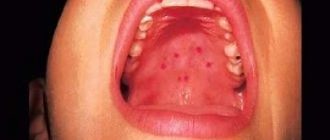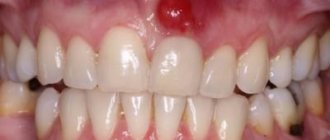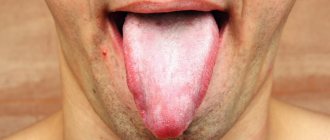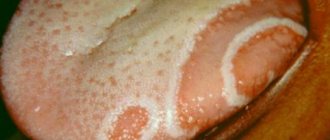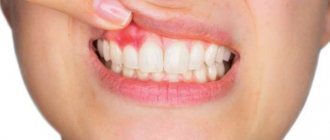Causes of tongue and throat pain
There are a huge number of diseases and other factors that can cause unpleasant painful sensations in the mouth. Their causes can be both very banal and unpredictable, so before you start panicking, it’s worth studying all the symptoms in detail. The source can be acquired diseases, pain can manifest itself against the background of severe or chronic pathologies of internal organs, and accompany the disease during its course.
Among the main causes of pain are:
- Inflammatory process of the larynx, which can be caused by the pathogenesis of the body's microflora;
- Allergic reaction;
- Various types of injuries to the tongue and larynx;
- Chemical or thermal burns of mucous tissue;
- Infectious, viral, fungal diseases (measles, staphylococcus, whooping cough, syphilis, tuberculosis, papilloma virus);
- Neoplasms (including malignant);
- Nervous system disorders;
- Vitamin deficiency, lack of vitamins (especially iron) in the body;
- Diseases of the thyroid and pancreas;
- Colds (flu, acute respiratory infections, ARVI, sore throat);
- Laryngitis, pharyngitis;
- Inflammation of the lymph nodes in the neck, oncology;
- Tonsillitis - inflammation of the tonsils;
- Enlarged adenoids.
It is very common to get injured by eating very hard foods. There are many cases of people piercing or scratching their larynx with fish bones. Spicy food can cause severe irritation, burning of the mucous membranes, it becomes painful to swallow , and irritation occurs. Such injuries occur quite often, but do not require special treatment and go away on their own.
Burns of the mucous membranes are common. This can happen due to ingestion of too hot food, hot drinks, a strong burning sensation and dryness occur. There are also chemical burns of the respiratory organs, which are directly related to a person’s professional activities. They can be obtained by inhaling toxic chemical fumes from paint, solvents, gasoline, alcohol and other liquids.
Burns, injuries, chemical exposure
If the root of the tongue hurts, the cause may be external influences:
- Thermal burns from drinking too hot drinks or food. In most cases, a person feels a burning sensation, pain, and numbness, but over time everything goes away on its own.
- Chemical exposure associated with accidental ingestion of household chemicals, inhalation of caustic fumes at work, and consumption of surrogate alcoholic beverages.
- Injuries associated with piercings, blows to the chin or face, unqualified dental treatment. Sometimes mechanical damage occurs during an attack of epilepsy, ingestion of sharp pieces of food (fish bones) or foreign bodies.
We suggest you read What to do if the hole and gums near the extracted tooth fester?
Symptoms
It would seem that everything is clear, my throat and tongue hurt, what other symptoms could there be? But the thing is that pain can manifest itself in completely different ways. With inflammation of the larynx (laryngitis), the throat begins to feel sore and dry, there is a sensation of a foreign body that you want to take out, a gusty cough occurs, it becomes painful and difficult to swallow food. In this case, the muscles of the tongue are in constant tension, which, in fact, causes an unpleasant aching pain.
How to help yourself
In order not to suffer from painful sensations at the root of the tongue, you should regularly carry out oral prophylaxis. Take vitamins, rinse with infusions of decoctions and visit a doctor. When the first symptoms appear, you wonder which doctor to go to. Unfortunately, there is no specific doctor who could deal with tongue diseases.
This is due to the fact that the tongue muscle does not have its own diseases. Painful sensations at the root of the tongue are a symptom of a certain illness. Looking at the tongue, doctors have long learned to identify diseases by its appearance. In a healthy state, it has a pink color without thorns, plaques or pain at the root of the tongue. For any deviations, you should look for the cause and treat it, and the symptoms will go away along with the disease!
When is it necessary to see a doctor, what could be the consequences?
If you have a sore throat, do not immediately panic, since most likely the problem lies in simple hypothermia (cold), especially if you do not have any serious health problems. But still, you shouldn’t take risks; you need to see a doctor as soon as possible.
The thing is that even the most harmless sore throat, colds and other respiratory diseases, which can be treated in 2–3 days, can cause complications. Self-medication and experimentation with health can be dangerous. The thing is that without special research, a person is not able to determine the root cause of this disease, and accordingly he goes to the pharmacy, buys local anesthetics that muffle the symptoms of the disease, rather than treat it. Thus, the disease becomes chronic and begins to manifest itself at the slightest weakening of the immune system.
Thus, if you get a sore throat, treat it yourself, but are not completely cured, if you get hypothermia or vitamin deficiency again, a relapse will occur. Such diseases pose a particular danger to children. If your child gets sick, starts sneezing, has snot, especially if the throat has already started to hurt, you should not wait until the cold begins to actively progress, you need to consult a doctor and begin immediate treatment. The thing is that such diseases in children cause complications and cause inflammation of the nasopharynx (laryngitis, pharyngitis). Since children's airways are very thin, their inflammation prevents the normal supply of oxygen, and in some cases, suffocation occurs.
Traumatic injury
Very often the cause of discomfort is damage to the tongue through mechanical, thermal or chemical effects. For example, when the side of your tongue hurts, you can suspect damage to your teeth. It is very easy to get injured in everyday life:
- hot or spicy food;
- medical manipulations in the oral cavity;
- biting, including during epileptic seizures;
- entry into the oral cavity of alkalis or acids;
- inhalation of caustic fumes;
- smoking;
- injuries received as a result of a fall, blow, fight, road accident;
- mechanical damage from foreign objects, etc.
A mucosal burn most often heals on its own, as do minor scratches. This is facilitated by the high regenerative ability of mucous tissue, as well as the effect of saliva.
More serious wounds take longer to heal, so auxiliary products can be used to prevent inflammation and speed up recovery. For example, it is useful to rinse your mouth with antiseptic solutions and drink herbal teas without sugar. In some cases, ointments and lotions are used for oral tissues.
Sometimes you have to seek help from a dentist. This is necessary if the injury to the tongue is repeated repeatedly due to the presence of bite defects, sharp chips on the teeth, as well as improper installation of fillings and crowns, braces or dentures.
Diagnostics
To diagnose such diseases, a medical examination by a pediatrician is not enough. To find out the true cause of such symptoms and correctly identify the disease, it is necessary to undergo a number of studies, namely:
- A biochemical blood test, which is prescribed by a doctor if the presence of viruses in the body is suspected;
- A smear of the mucous tissue of the larynx, which can detect staphylococcus, whooping cough and various fungal diseases;
- PCR or polymerase chain reaction. It is carried out when an allergy is suspected to identify the allergen;
- Laryngoscopy. This research method is used mainly for mechanical or thermal damage to the walls of the larynx in order to understand the degree and size. This study is carried out using a laryngoscope - a device in the form of a tube, at the end of which is attached a camera that transmits an image to a monitor;
- X-ray with a contrast agent, which helps to determine inflammatory processes, and more precisely, their size;
- Ultrasound examination of the larynx;
- If cancer is suspected, a biopsy is performed.
Such studies are absolutely sufficient to identify the disease.
Basic treatment
If you have a sore throat, you must definitely use drug therapy. It is the main treatment method aimed at eliminating the underlying cause of the disease and alleviating unpleasant symptoms. It includes:
- Taking antiviral antibiotic drugs that can suppress the virus that provoked the disease (Amizon, Zovirax, Ingavirin, Livarol);
- Antihistamines, which can relieve inflammation of the larynx, are often used for allergies (Tavegil, Suprastin, Diazolin, Loratadine);
- Painkillers (No-Shpa, Lidocaine, Ketanov, Segan). They are used for damage to the mucous membranes, when it is painful to swallow food, in order to reduce sensitivity as much as possible;
- Local anesthetics (Ingalipt, Orasept, Hexoral), which have antibacterial properties, prevent the proliferation of infectious bacteria;
- Immunomodulators and prebiotics that increase the support function of the immune system (Illuminal, Linex, Aflubin, Imudon).
If other symptoms are present, such as chills, fever, headache, doctors prescribe additional medications. Remember, only a doctor can prescribe which drug and in what quantity you need to take it.
Concomitant treatment
Just taking medication is not always enough. In order to speed up the rehabilitation process, ancient folk methods are used, which effectively help not only alleviate the patient’s condition, but also contribute to his accelerated recovery. These include:
- Drink plenty of fluids (warm, not hot drinks), especially when the throat is very sore, its mucous membranes are irritated, or when the larynx is inflamed. It is recommended to use decoctions of medicinal herbs (chamomile, calendula, echinacea, sage). They are able to relieve inflammation and relieve pain, moisturize irritated mucous membranes, relieve strong coughing impulses during laryngitis;
- Warm compresses. It is necessary to moisten a small terry towel in warm water and apply it to the neck. An excellent way to relieve inflammation of the lymph nodes;
- Warm milk with butter helps soften damaged mucous walls and speed up the healing process. This method is suitable for small children who find it difficult to chew and painful to swallow food due to an inflamed larynx;
- Rinsing. For rinsing, it is best to use non-aggressive substances, that is, salt and soda should be excluded. In a small glass of warm water you need to dissolve a tablespoon of calendula tincture, a few drops of propolis and eucalyptus. Gargle every three hours. This is an excellent remedy for purulent sore throat;
- Inhalations. This is the best option for any kind of respiratory diseases. You need to add a few drops of essential oil (eucalyptus, fir, cedar, tea tree) to the inhaler and pour boiling water over it. It is strictly forbidden to use citrus oils when you have a sore throat, as they only irritate the mucous membranes even more.
It is worth remembering that the immune system plays a huge role in such diseases, so it should be strengthened in every possible way. This can be done with fresh fruits, berries and vegetables. You can steam vitamin teas based on cranberries, sea buckthorn, viburnum, rose hips, with the addition of honey.
What not to do!
If you have a sore throat, under no circumstances should you:
- Smoking. Tobacco smoke has a strong effect on the mucous membranes, dries them out and causes severe irritation;
- Drink alcoholic beverages. The composition of such drinks includes alcohol, which can burn the larynx even more;
- Reduce communication to a minimum. For laryngitis and other inflammatory processes, complete silence and rest are recommended;
- Eating hot, spicy, salty and peppery foods is prohibited.
If you adhere to all the recommendations and instructions of the attending physician, follow all the rules of the treatment prescribed by him, the disease will recede without the risk of recurrence!
Glossitis
Why does my tongue hurt? Inflammation of the mucous membrane of the tongue is called glossitis. This process can be diffuse over the entire surface of the organ or local - only on the root or back of the tongue. The root of the tongue or the entire surface hurts - these symptoms often accompany the inflammatory process.
Glossitis is caused by various factors. It is promoted by infectious diseases, injuries, burns by chemical and thermal factors.
The disease has several clinical forms:
- Superficial often accompanies stomatitis and has similar manifestations. Areas of ulceration appear on the surface of the mucosa, accompanied by swelling. Pain in the tongue occurs when the mucous membrane is irritated. The disease is promoted by bad habits and poor hygiene.
- Catarrhal - in this form, only the mucous membrane is also affected, but the inflammation is more pronounced. The tongue swells and becomes dense. Pain is observed constantly, there is plaque on the surface, and salivation increases.
- Deep - a severe variant with damage to the underlying layers of the organ. In this case, purulent inflammation occurs. The lymph nodes become enlarged and the general condition of the body suffers. Often requires surgical treatment.
- Ulcerative – caused by pathogenic fungi. Promotes the appearance of deep erosions on the mucous membrane and bleeding. It is accompanied by the appearance of a white or gray plaque and is difficult to treat.
If the root of the tongue or other parts of it hurt, you must definitely suspect this disease.




